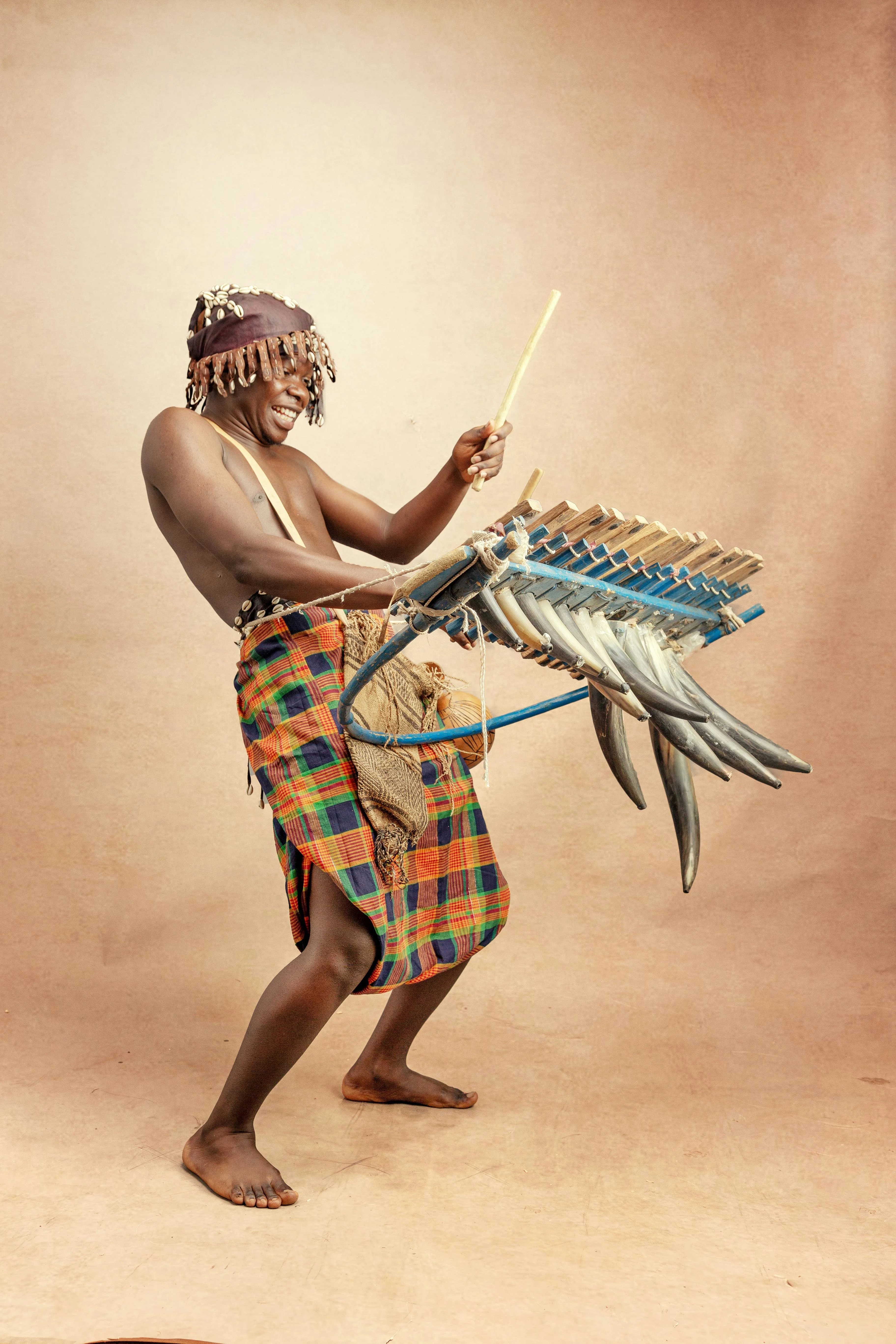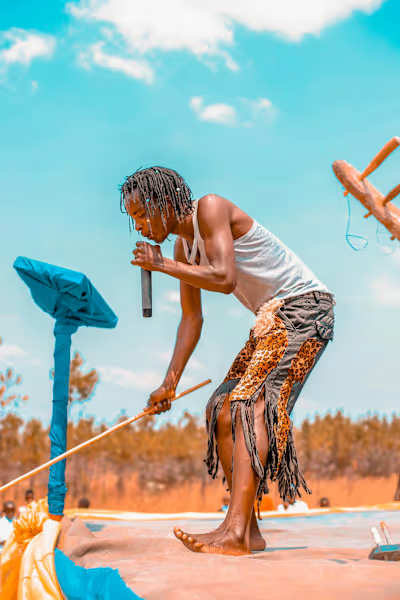The Evolution of Music in Africa
Africa and music are inseparable. It's not just something we do—it's who we are. Whether it's the rhythmic heartbeat of a drum, a soulful tune hummed under the African sun, or the modern-day Afrobeats taking over global charts, African music tells stories, heals, unites, and most importantly, gets the body moving! Let's dive into the fascinating (and funky) evolution of music on the continent—from the ancient drum circles to today's viral dance challenges.
1. The Beginnings: Where It All Started (Cue the Drums)

The artful Musician
Before music went digital, before the days of MP3s and Bluetooth speakers, Africa was already jamming. Picture this: early communities gathered around a fire, and in the center of it all—drums. The drum wasn’t just an instrument; it was the original social media! Messages were sent over long distances using rhythms (no Wi-Fi needed), celebrations were ignited, and most importantly, the groove was born.
The djembe, talking drum, and many other percussive instruments were at the heart of African music. Each beat carried meaning—whether celebrating a harvest or signaling a war. You think your Spotify playlist is versatile? These drums were the whole deal!
2. The Voice: Africa’s Original Auto-Tune
Now, let's not forget the power of the voice. Long before Beyoncé, African vocal traditions were flexing vocal cords in styles that are still unmatched. From the powerful chants of the Maasai in East Africa to the intricate harmonies of the Zulu people in Southern Africa, Africans knew how to work those vocal cords. The voice was an instrument, a storyteller, a healer—and it didn’t even need auto-tune.
Fun fact: The world’s most famous yodeling? It’s not from Switzerland—it’s from the Pygmy tribes in Central Africa. They were hitting high notes before it was cool.
3. Traditional Instruments: Kora, Mbira & Beyond
Now, let's talk about Africa’s instrument lineup. It’s way more than just drums (though, let's face it, drums are awesome). There's the kora, a 21-stringed beauty from West Africa, often called the African harp. Then we’ve got the mbira (thumb piano), with its twinkling sound that's as mesmerizing as your crush's text notifications.
Each region in Africa has its unique sound, rooted in instruments that connect the people to their land, history, and ancestors. You might say these instruments are the OG "Spotify Wrapped"—telling the story of where you've been and what you've been through.
4. Colonial Influence: A New Tune
Fast forward to the colonial period—when things took a (serious) turn. Colonialists brought along their musical styles and instruments, including guitars, pianos, and Western-style melodies. African musicians, ever the creative geniuses, took these foreign sounds, mixed them with traditional beats, and birthed entirely new genres. Jazz, Afro-Cuban, and the blues all have their roots in this fusion, thanks to the transatlantic slave trade.
What’s beautiful here is how African music adapted without losing its soul. African musicians took European and American musical ideas, and—dare we say it—made them cooler by infusing them with local sounds. Suddenly, you’ve got the rise of highlife in West Africa and jazz-influenced music across the continent. And that's how African music started traveling the globe, with its suitcase packed with soulful stories.
5. Afrobeats: Africa Takes Over the World
Now we’ve arrived at the good stuff: Afrobeats. This genre didn’t just put Africa on the map—it redesigned the map. From Lagos to London, Accra to Atlanta, Afrobeats is shaking up the world with infectious rhythms and a fusion of African and Western influences.
Fela Kuti, the "godfather" of Afrobeat (yes, without the 's'), paved the way in the 1970s with his politically charged music. But today, the ‘s’ was added, and Afrobeats has become a whole different beast—more upbeat, more danceable, and more global. Icons like Burna Boy, Wizkid, and Yemi Alade are taking African music to every corner of the globe, making it impossible not to move when their tracks come on.
And the best part? Afrobeats isn’t just a sound—it’s a vibe. It’s an energy that makes you feel like you can conquer the world or at least nail that viral dance challenge on TikTok.
6. Hip-Hop, House, and the Rise of African Pop
Alongside Afrobeats, African hip-hop and house music are doing their thing. In South Africa, the world was introduced to kwaito and gqom, house music’s vibrant, more intense cousins. The infectious beats are designed for the dance floor, and let’s just say, South Africans are experts in making the ground shake!
Across the continent, hip-hop has also taken root. African artists like Sarkodie (Ghana), Nasty C (South Africa), and Khaligraph Jones (Kenya) have become lyrical kings and queens, blending local languages and beats with the global hip-hop culture. And guess what? Africa has its own flavor of hip-hop—more relatable, grounded, and always with a story to tell.
7. The Digital Era: Streaming & Social Media Takeover
In the 21st century, African music went digital, baby! With platforms like YouTube, Apple Music, and Spotify, the whole world can now vibe to African rhythms at the tap of a button. Social media has also played a huge role, with dance challenges and viral trends spreading African music like wildfire.
From local church choirs uploading their soulful harmonies to international stars dropping surprise albums, the digital world has brought African music to every corner of the globe.
8. The Future of African Music
So, what's next? Well, if the past is any indication, African music will continue to evolve, surprise, and conquer. With its rich heritage and unstoppable creativity, we can expect more genre fusions, new sounds, and maybe even a hologram concert or two.
Africa's musical journey has been one of constant reinvention, but one thing remains: the heartbeat of the continent is forever in its music. From ancient drums to digital beats, African music continues to inspire, entertain, and most importantly, bring people together.
So, whether you’re bopping to Afrobeats, swaying to some soothing kora music, or jamming to the latest gqom track, just know—Africa’s music scene is only getting started.
Now, grab those headphones, hit play, and let Africa take you on a musical journey like no other!
Like this project
Posted Oct 11, 2024
This blog post delves into the evolution of African music, from traditional rhythms to its influence on global sounds.
Likes
0
Views
5



